AuthorTerry R Baughman is Lead Pastor for LifeChurch in Gilbert, AZ. See his complete bio at trbaughman.com Archives
July 2024
Categories |
Back to Blog
Honor the Past, Celebrate the Future5/26/2019 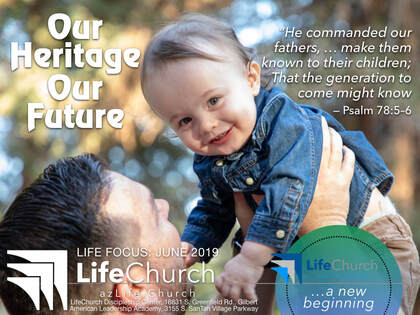 Honor the Past, Celebrate the Future GOD’S PLAN FOR THE FAMILY Terry R. Baughman “When your children ask in time to come, saying, ‘What do these stones mean to you?’ Then you shall answer them that the waters of the Jordan were cut off before the ark of the covenant of the Lord; when it crossed over the Jordan, the waters of the Jordan were cut off. And these stones shall be for a memorial to the children of Israel forever” (Joshua 4:6–7). The past is an awesome place to visit, but certainly no place to live. History lives to instruct our decisions and direct our lives. The lessons of history provide a legacy upon which to build the future and a culture to correct our course. Our heritage is a foundation upon which to build, not a monument in which to dwell. An abode designed in a monument provides no place for growth and no windows for vision to peer into the future. A monument exists only to honor the past and has no ambition to explore possibilities to come. A graveyard is not considered prime real estate for residential development. It lacks curb appeal and provides little scenic value for a family neighborhood. No one would want to put a beautiful home in the middle of tombstones and a meadow of memorials. We want our cemeteries, but at a distance. Let it be a place for mourning, for closure, and for remembrance, but never a prime location for a dwelling. Memorials are important they remind us of past sacrifices. Monuments are made to remember the moments of important events and to be challenged by them. Our memorials define our existence and establish our history. Memories and memorials recall past events and moments of great joy or tragedy, accomplishments or defeats. They keep the past alive for the present as lessons learned and sacrifices made, but they are never intended to be an occasion to relive or repeat. Life is to be lived in the present and fulfilled in the future. As long as we have life we can dream of tomorrow and envision something more. Much of life is filled with plans for tomorrow and better days ahead. Opportunities exist for realization in the future and promises propel us to attempt greater things. Joshua was instructed to build a memorial on the banks of the Jordan, but they were commanded to conquer Canaan. Both were in obedience to God’s voice and were vital to their success. The conquest of Canaan was their purpose for returning to the land after 400 years in Egypt. However, the memorial at the Jordan crossing would remind them of God’s miraculous provision and reaffirm the stories of God’s power. The children of a future generation would ask, “What do these stones mean?” In that moment a lesson taught extended the promise and provision of God into a future. God’s promises are for more than the present. His plan stretches from the beginning to end. The memorials of past miracles and the monuments of great revelation give us occasion to extend His Word, His power, and His truth to another generation. Pentecost was more than a memorable event in the past. We will commemorate the initial event but also anticipate future experiences. The Day of Pentecost was a launch pad, a new beginning to future spiritual provision. Peter explained then and reminds us now, “The promise is to you and to your children, and to all who are afar off, as many as the Lord our God will call” (Acts 2:39). Scripture: “[Cornelius] … and all his family were devout and God-fearing; he gave generously to those in need and prayed to God regularly” (Acts 10:2 NIV).
0 Comments
Read More
Back to Blog
Home Mission5/19/2019 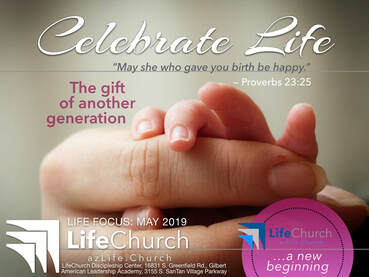 Home Mission GOD’S PLAN FOR THE FAMILY Terry R. Baughman “Children, obey your parents in the Lord, for this is right. ‘Honor your father and mother’—which is the first commandment with a promise—‘so that it may go well with you and that you may enjoy long life on the earth.’ Fathers, do not exasperate your children; instead, bring them up in the training and instruction of the Lord” (Ephesians 6:1–4 NIV). God has a plan for the world. It begins in the home and was initiated in the family unit. When God saw that it was not good for man to be alone, He created a woman to complete him and be his compatible helper. To this union God granted the creative power of reproduction and children were born in the expanding definition of family. Through families the earth was populated, cultivated, and cultured, creating an environment of continuance and the possibility for life to have fulfillment and purpose. Throughout history the family has been the basic unit of society and the means of perpetuating the human race. Without the safety of family and the protective guidance of parents there would be no chance for children to survive and no future of progeny. Without children there would be no families and the human race would become extinct within one generation. The future depends on the success of the family and the continuation of the species is incumbent on our ability to protect this institution that God ordained in the beginning. “Therefore a man shall leave his father and mother and be joined to his wife, and they shall become one flesh” (Genesis 2:24). The plan of God is dependent on families and our commitment to teach His Word and His plan to each succeeding generation. Moses instructed the people concerning the commandments of the Lord, “And these words which I command you today shall be in your heart. You shall teach them diligently to your children, and shall talk of them when you sit in your house, when you walk by the way, when you lie down, and when you rise up” (Deuteronomy 6:6–7). The transmission of God’s Word is an essential task and is to be incorporated into everyday life. His commandments are not just, “Thou shall not’s,” but daily guidance for all of life’s challenges. Every father and mother are missionaries. They have the responsibility of sharing the gospel to their family and establishing God’s truth in their home. As parents our primary mission is to communicate the most critical beliefs to our children as they are bearers of truth to the next generation. From the foundation of the church in the Book of Acts the vital need of family inclusion was recognized. Peter quoted Joel’s prophecy declaring that the Holy Spirit was being poured out on young and old, male and female. He included the next generation when he said, “Your sons and your daughters shall prophesy” (Acts 2:17). Following the message at Pentecost, Peter responded to their questions and gave direction so that all might receive the gift of the Holy Spirit. He illustrated the inclusiveness of the gift of the Spirit for more than the present audience. He stated, “The promise is to you and to your children, and to all who are afar off, as many as the Lord our God will call” (Acts 2:39). Our mission begins at home. We can read wonderful stories of past experiences of heroes of faith in the words of Scripture. Faith building testimonies of other believers can increase our faith. Sharing truth from messages of preaching and teaching can also be a way of building faith in the hearts of our family members. This is our mission and our joy. Let it begin at home. Scripture: “[Cornelius] … and all his family were devout and God-fearing; he gave generously to those in need and prayed to God regularly” (Acts 10:2 NIV).
Back to Blog
Pain and Blessing of Motherhood5/12/2019 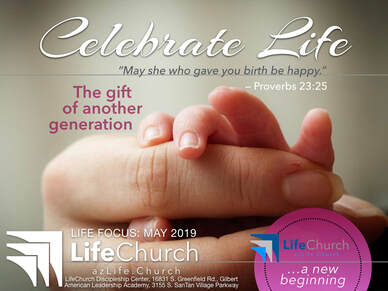 Pain and Blessing of Motherhood GOD’S PLAN FOR THE FAMILY Terry R. Baughman “A woman giving birth to a child has pain because her time has come; but when her baby is born she forgets the anguish because of her joy that a child is born into the world” (John 16:21 NIV). The pain of childbirth is intense. The process of giving birth is called labor for a reason. Contractions usually begin slowly, sometimes several days before the delivery, as the body begins to prepare for this miraculous event. Nervous parents begin timing the frequency of the contractions knowing that the closer together they occur signals the long awaited arrival of the newborn. With the increased timing of contractions there is also growing intensity of the pain. Some mothers welcome the administration of pain medications while others are determined to endure the suffering so as to avoid a longer recovery period. Though no one looks forward to suffering, the anticipation of the newborn child makes the pain bearable and creates an eager expectation in the process. Looking beyond the severity of suffering there is the bright hope to hear the cry of new life. Most feel that the pain of the present is worth the reward in the future. The pain of giving birth results from the original sin in the Garden of Eden. Because of their disobedience to God certain consequences continue to be experienced in life. Part of the curse of sin was appropriated to the woman, “I will make your pains in childbearing very severe; with painful labor you will give birth to children” (Genesis 3:16 NIV). Some of the rivalry between the sexes is also a result of the curse. God further told Eve, “Your desire will be for your husband, and he will rule over you.” Adam was also suffered for his disobedience to God, “Cursed is the ground because of you; through painful toil you will eat food from it all the days of your life. …By the sweat of your brow you will eat your food” (Genesis 3:17, 19 NIV). Because of original sin there is pain in producing food and bearing children … but through suffering comes blessing. There is abundant harvest received as the fruit of our labor, children as a result of birth, and the satisfaction of future fulfillment in a life well lived. In the Psalms, the writer observed the balance of pain and reward, weeping and rejoicing. They sang, “Weeping may endure for a night, But joy comes in the morning” (Psalm 30:5). The joy of reward comes after the sorrow of labor, “He who continually goes forth weeping, Bearing seed for sowing, Shall doubtless come again with rejoicing, Bringing his sheaves with him” (Psalm 126:6). Perhaps the greatest illustration of these principles are found in motherhood. Mothers stand as the greatest example of sacrifice and suffering, and are revered for their joyful service, giving life for generations to come. Honor is appropriate for every mom or mentor who have sacrificed for our benefit. The accomplishments of our lives and the successes we attain are attributed to those who have given us birth and those who have granted guidance in our development. The rewards we achieve are attributed to the sacrifices of those who have loved us from the beginning. Our lives in Christ are a tribute to our mentors. John said, “I have no greater joy than to hear that my children are walking in the truth” (3 John 4 NIV). Scripture: “[Cornelius] … and all his family were devout and God-fearing; he gave generously to those in need and prayed to God regularly” (Acts 10:2 NIV).
Back to Blog
In the Beginning5/5/2019 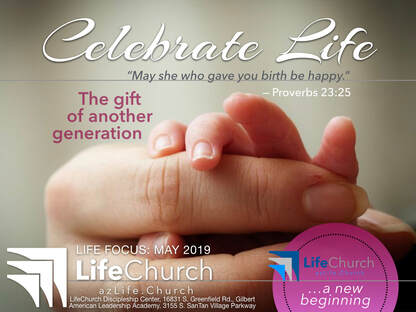 In the Beginning GOD’S PLAN FOR THE FAMILY Terry R. Baughman “In the day that God created man, He made him in the likeness of God. He created them male and female, and blessed them and called them Mankind in the day they were created. And Adam … begot a son in his own likeness, after his image, and named him Seth” (Genesis 5:1–3). The divine order of Creation established an understanding of intended purpose for humanity’s existence for all time. Rather than the suggestion of a random evolution of stimuli shaping our social character and conduct, there were clearly defined plans for social order and the continuance of the human race from the earliest moments of our existence. Humanity is the only part of God’s Creation that was designed by divine deliberation. While everything else emerged with the command, “Let there be” or “Let the earth bring forth,” the first man was designed with the image of Deity as the model after God took counsel of His own will, “Let us make man in our image” (Genesis 1:26). Then God acted on His resolve, “So God created man in His own image; in the image of God He created him; male and female He created them” (Genesis 1:27). From this initial overview of the days of Creation, Genesis goes on to fill in some of the details that we crave. The next chapter reveals the composition of the first man, “The Lord God formed man of the dust of the ground, and breathed into his nostrils the breath of life; and man became a living being” (Genesis 2:7). From the dirt the first man was fashioned connecting him with earth. The breath of life came from God and gave him life connecting him with the eternal and empowering him with a spiritual essence. God’s foundation for the family is also seen from the beginning. While all of the animal kingdom had the male and female counterpart, Adam was lacking a compatible partner. God acknowledged, “It is not good that man should be alone; I will make him a helper comparable to him” (Genesis 2:18). Taking a rib from the sleeping man God designed a woman for Adam to be of his flesh and bone. Thus He established the unification of marriage. “Therefore a man shall leave his father and mother and be joined to his wife, and they shall become one flesh” (Genesis 2:24). Marriage is designed as a spiritual connection between two distinct individuals, male and female, resulting in the ultimate unification of both flesh and spirit. This marriage provides for procreation, the succession of the species, and continuing hope for restoration. Children are a natural outgrowth of this union and a continuation of the lineage of succession and the promised blessing, “Children are a heritage from the Lord, offspring a reward from him” (Psalm 127:3 NIV). In God’s original pattern there was no provision for divorce, “What God has joined together, let no one separate” (Matthew 19:6 NIV). When Jesus was asked about the issue of divorce He referenced Moses’ Law defining the guidelines for the issue, but He further reminded them, “It was not this way from the beginning” (Matthew 19:8 NIV). When all things were made in the perfection of the first Creation there was no need for division or divorce. Following God’s pattern, one man and one woman, serving God in a sinless environment allows the latitude of social development and the foundation of family relationships. Because of the judgment of the first sin and the injury of brokenness in our relationship with God we continue to strive for restoration of that perfect pattern. God’s plan will always be the best design for social interaction and a faithful foundation for our families. Scripture: “[Cornelius] … and all his family were devout and God-fearing; he gave generously to those in need and prayed to God regularly” (Acts 10:2 NIV). |

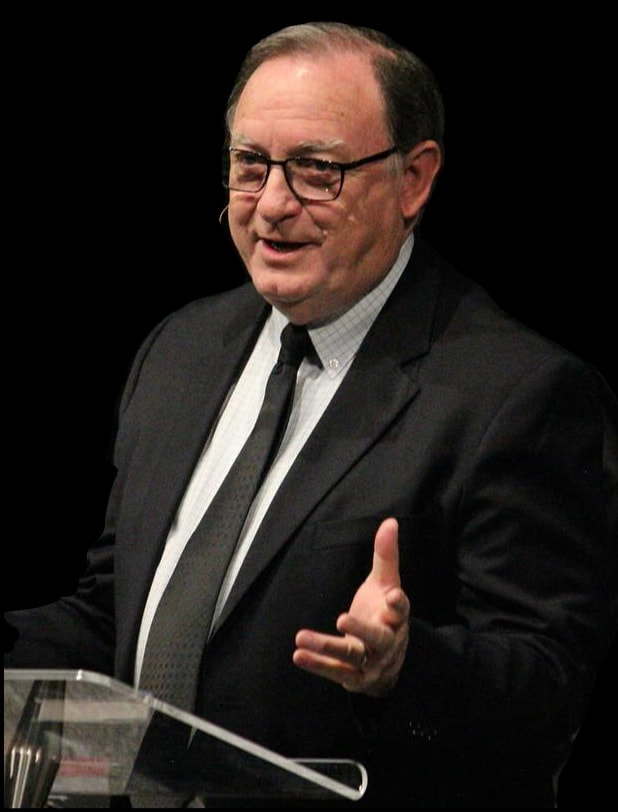
 RSS Feed
RSS Feed